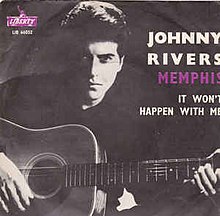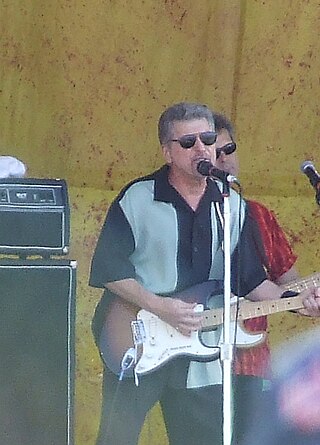
Johnny Rivers is a retired American musician. He achieved commercial success and popularity throughout the 1960s and 1970s as a singer and guitarist, characterized as a versatile and influential artist. Rivers is best known for his 1960s output, having popularized the mid-60s discotheque scene through his live rock and roll recordings at Los Angeles' Whiskey a Go Go nightclub, and later shifting to a more orchestral, soul-oriented sound during the latter half of the decade. These developments were reflected by his most notable string of hit singles between 1964 and 1968, many of them covers. They include "Memphis", "Mountain of Love", "The Seventh Son", "Secret Agent Man", "Poor Side of Town", "Baby I Need Your Lovin'", and "Summer Rain". Ultimately, Rivers landed 9 top ten hits and 17 top forty hits on US charts from 1964 to 1977.
Fraternity Records is a small record label based in Cincinnati, Ohio. It was started by Harry Carlson and silent partner Dr. Ashton Welsh in 1954. The first recording to be released on Fraternity was Jerri Winters' "Winter's Here". The first hit was Cathy Carr's rendition of a Tin Pan Alley song, "Ivory Tower" in 1956. It made #2, besting a cover version by Otis Williams & the Charms. A year later came the Jimmy Dorsey #2 charting instrumental "So Rare", the famous bandleader's final hit before his death. 1959 saw another big hit, Bill Parsons' "The All American Boy", which also peaked at #2 on the Billboard pop charts. Parsons was a friend of country singer Bobby Bare and it was actually Bare's voice heard on the hit record. Parsons sang on the B-side. Fraternity also leased songs from smaller labels, including one track by Jackie Shannon.

"Johnny B. Goode" is a song by American musician Chuck Berry, written and sung by Berry in 1958. Released as a single in 1958, it peaked at number two on the Hot R&B Sides chart and number eight on its pre-Hot 100 chart. The song remains a staple of rock music.
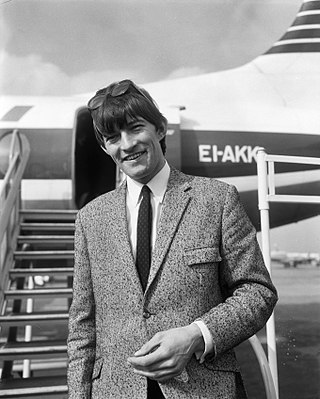
Dave Berry is an English rock singer and former teen idol during the 1960s. His best-remembered hits are "Memphis, Tennessee", "The Crying Game" (1964) and his 1965 hit "Little Things", a cover version of Bobby Goldsboro's Stateside top 40 success.

"(Just Like) Starting Over" is a song written and performed by John Lennon from the 1980 album, Double Fantasy. It was released as a single on 24 October 1980 in the United Kingdom, with Yoko Ono's "Kiss Kiss Kiss" as the B-side. It reached number one in both the US and UK after Lennon was murdered on 8 December 1980. It was Lennon's final single released in his lifetime.

"Promised Land" is a song lyric written by Chuck Berry to the melody of "Wabash Cannonball", an American folk song. The song was first recorded in this version by Berry in 1964 for his album St. Louis to Liverpool. Released in December 1964, it was Berry's fourth single issued following his prison term for a Mann Act conviction. The record peaked at #41 in the Billboard charts on January 16, 1965.
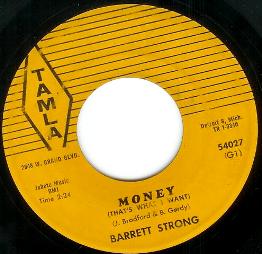
"Money (That's What I Want)" is a rhythm and blues song written by Tamla founder Berry Gordy and Janie Bradford, which was the first hit record for Gordy's Motown enterprise. Barrett Strong recorded it in 1959 as a single for the Tamla label, distributed nationally on Anna Records. Many artists later recorded the tune, including the Beatles in 1963 and the Flying Lizards in 1979.

"Rock and Roll Music" is a song by American musician and songwriter Chuck Berry, written and recorded by Berry in May 1957. It has been widely covered and is one of Berry's most popular and enduring compositions.

"Roll Over Beethoven" is a 1956 song written by Chuck Berry, originally released on Chess Records, with "Drifting Heart" as the B-side. The lyrics of the song mention rock and roll and the desire for rhythm and blues to be as respected as classical music. The song has been covered by many other artists, including the Beatles and the Electric Light Orchestra. Rolling Stone magazine ranked it number 97 on its list of the "500 Greatest Songs of All Time".

"Do You Want to Know a Secret" is a song by English rock band the Beatles from their 1963 album Please Please Me, sung by George Harrison. In the United States, it was the first top ten song to feature Harrison as a lead singer, reaching No. 2 on the Billboard chart in 1964 as a single released by Vee-Jay, VJ 587. In the UK, Billy J. Kramer released a cover of the song as his debut single, reaching No. 1 on the NME singles chart and No. 2 on the Record Retailer chart.
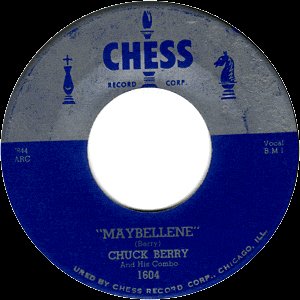
"Maybellene" is a rock and roll song by American artist Chuck Berry, adapted in part from the western swing fiddle tune "Ida Red". Released in 1955, Berry’s song tells the story of a hot rod race and a broken romance, the lyrics describing a man driving a V8 Ford and chasing his unfaithful girlfriend in her Cadillac Coupe DeVille. It was released in July 1955 as a single by Chess Records, of Chicago, Illinois. Berry's first hit, "Maybellene" is considered a pioneering rock and roll song. Rolling Stone magazine wrote of it, "Rock & roll guitar starts here." The record was an early instance of the complete rock and roll package: youthful subject matter; a small, guitar-driven combo; clear diction; and an atmosphere of unrelenting excitement.

"Angel of the Morning" is a popular song written by Chip Taylor, originally recorded by Evie Sands but which first charted with a version by Merrilee Rush. The song has been covered by many artists including Chrissie Hynde, Dusty Springfield, P. P. Arnold, Connie Eaton, Mary Mason, Guys 'n' Dolls, Melba Montgomery, Olivia Newton-John and most recognizably by Juice Newton.
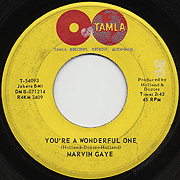
"You're a Wonderful One" is a popular recording written by Holland–Dozier–Holland and recorded and released as a single by Marvin Gaye, released in 1964 on the Tamla label. It charted at #15 on the Billboard Hot 100.

"(They Long to Be) Close to You" is a song written by Burt Bacharach and Hal David with sections of the early version written by Cathy Steeves. The best-known version is that recorded by American duo The Carpenters for their second studio album Close to You (1970) and produced by Jack Daugherty. Released on May 14, 1970, the single topped both the US Billboard Hot 100 and Adult Contemporary charts. It also reached the top of the Canadian and Australian charts and peaked at number six on the charts of both the UK and Ireland. The record was certified gold by the Recording Industry Association of America (RIAA) in August 1970.

St. Louis to Liverpool is the seventh and tenth overall studio album by the American musician Chuck Berry. Released in 1964 by Chess Records. It peaked at number 124 on the US Billboard album chart, the first of Berry's studio albums to appear on the chart. Music critic Dave Marsh called St. Louis to Liverpool "one of the greatest rock & roll records ever made".

"Sweet Little Sixteen" is a rock and roll song written and first recorded by Chuck Berry, who released it as a single in January 1958. His performance of it at that year's Newport Jazz Festival was included in the documentary film Jazz on a Summer's Day. It reached number two on the Billboard Hot 100, one of two of Berry's second-highest positions—along with Johnny Rivers cover of "Memphis, Tennessee"—on that chart. "Sweet Little Sixteen" also reached number one on the R&B Best Sellers chart. In the UK, it reached number 16 on the UK Singles Chart. Rolling Stone magazine ranked the song number 272 on its list of the "500 Greatest Songs of All Time" in 2004. He used the same melody on an earlier song, "The Little Girl From Central" recorded on Checkmate in 1955.
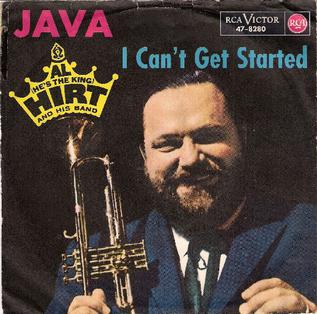
"Java" is an instrumental adaptation from a 1958 LP of piano compositions, The Wild Sounds of New Orleans, by Tousan, also known as New Orleans producer/songwriter Allen Toussaint. As was the case of the rest of Toussaint's LP, "Java" was composed in studio, primarily by Toussaint.

"Little Queenie" is a song written and recorded by Chuck Berry. Released in March 1959 as a double A-side single with "Almost Grown", it was included on Chuck Berry Is on Top (1959), Berry's first compilation album. He performed the song in the movies Go, Johnny Go! (1959) and Hail! Hail! Rock 'n' Roll (1987). One year earlier, Berry had released "Run Rudolph Run", a Christmas song with the same melody.

"Reelin' and Rockin'" is a song written and recorded by Chuck Berry. It was originally recorded in 1957 and released as the B-side of "Sweet Little Sixteen".

"Surfin' U.S.A." is a song by the American rock band the Beach Boys, credited to Chuck Berry and Brian Wilson. It is a rewritten version of Berry's "Sweet Little Sixteen" set to new lyrics written by Wilson and an uncredited Mike Love. The song was released as a single on March 4, 1963, backed with "Shut Down". It was then placed as the opening track on their album of the same name.

